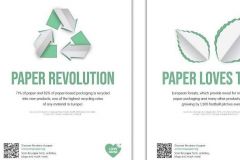According to a survey carried out by Two Sides, 79% of French people believe they should be able to choose between paper and digital formats when receiving documents such as invoices or bank statements. This figure reflects a clear desire not to be constrained by imposed dematerialization strategies. This right to choose is seen as an essential element in the relationship between companies and their customers.
Paper remains the benchmark for long-term document storage. In fact, 56% of consumers find it more convenient to archive their bills and statements in paper format than in digital format. This finding cuts across all generations, and reflects a mistrust of digital solutions often perceived as ephemeral or complex to manage.
Another key element in this preference is security. With 66% of consumers concerned about the risk of piracy or theft of personal data, digital media are becoming increasingly distrusted. Paper, on the other hand, offers a peace of mind that digital solutions have yet to match.
Although dematerialization is frequently presented as an ecological advance, the study reveals that 55% of Europeans believe that these arguments are often misleading. In their view, the rhetoric serves more to reduce costs for companies than to genuinely protect the environment. This perception highlights the need for economic players to provide transparent explanations of their communication choices.
Paper retains an appeal that transcends generations, especially for documents deemed important or sensitive. In addition to its practicality, it is perceived as a more reliable and accessible solution. This observation is prompting companies and public authorities to re-evaluate their dematerialization policies, taking greater account of consumer preferences.
Digital does not always meet consumer expectations. Companies therefore need to think about balanced approaches, reconciling paper and digital media, in order to meet the varied needs of their users. In a world of rapidly evolving technologies, the question of the environmental impact of digital solutions also deserves to be explored in greater depth.








